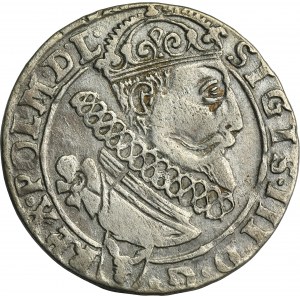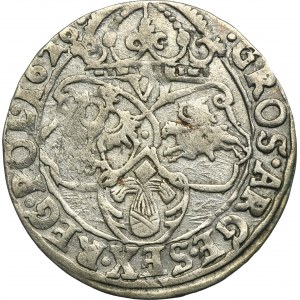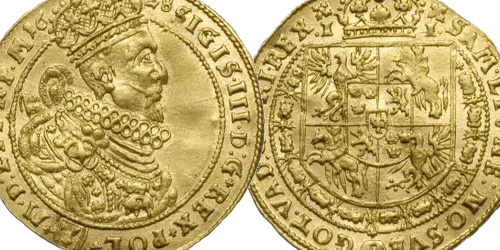The background of the monetary history of the Commonwealth during the reign of Sigismund Vasa was the progressive monetary crisis caused by the situation in Germany and the influx of spodleniated German coinage into Poland. Initially, the mint rate was determined by Stefan Batory's ordinance of 1580. With the crisis deepening, in 1601 it was decided to raise the mint rate, i.e. devalue the denominations in circulation. The following years saw further legislation lowering the silver content of various denominations. Of these, the most important was the Ordinance of 1623. It introduced a stable monetary system, based on the monetary system of the Empire. During the reign of Sigismund III, new denominations appeared in the Polish-Lithuanian Commonwealth - three-cornered coins, halves and orts. In turn, in 1621, the highest denomination in the history of Polish money was minted at the Bydgoszcz mint - the hundred-drachma. This was the crowning achievement of the intensive issuance of gold coins during the reign of Sigismund III. Crown mints (Olkusz, Wschowa, Poznań, Malbork, Bydgoszcz, Lublin, Kraków, Warsaw), Lithuanian mints (Vilnius), municipal mints (Gdańsk, Elbląg, Toruń, Riga, Poznań, Wschowa) and a private mint in Łobżenica worked during this period. Sigismund Vasa's Swedish coins were issued by mints in Stockholm, Rewal and Malbork. In 1627, a decision was made to stop issuing small coinage. This decision remained in force until 1650.
The first issues of Sigismund Vasa's crown sixpences were based on Stefan Batory's minting ordinance of 1580. Thus, they were minted from good silver of the thirteenth ½-arc, weighed an average of 4.881 g and contained 4.118 pure bullion. Sixpences were minted in Wschowa (1595, 1599, 1601), Lublin (1595, 1596), Bydgoszcz (1596) and Malbork (1596, 1599-1601). Some of the varieties of sixpences were modeled on trojaks with a bust of the king and an obverse inscription on the obverse, and with a characteristic drawing of the reverse containing a zonal inscription in three lines alongside coats of arms and mintmarks. This applies to all varieties from the mints of Wschowa and Bydgoszcz, as well as to some varieties from the Lublin mint from 1595. In 1595, a new iconographic scheme was developed in Lublin, where the zonal inscription appeared instead of the zonal inscription, while a juxtaposition of coats of arms and mint marks was placed in the coin field under the crown. This scheme was also adopted at the Malbork mint (the sixpences were stamped there using a cylindrical minting machine) and from 1623 at the Cracow mint. Stefan Batory's Ordinance of 1580 was the basis for the issuance of crown sixpences until 1601. Production of this denomination was resumed only after a 20-year break (1623-1627). During the latter period, they were minted at the Kraków mint from sterling silver ¼ of a flake. They weighed an average of 4.036 grams and contained only 1.829 grams of pure bullion.









